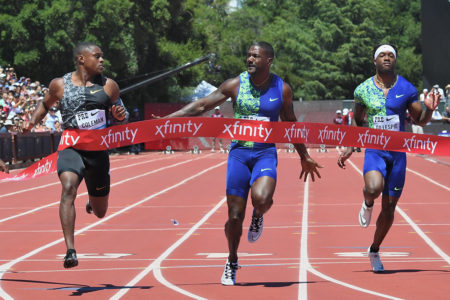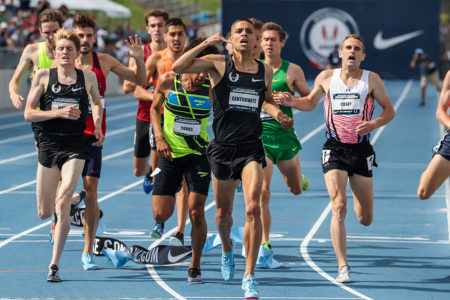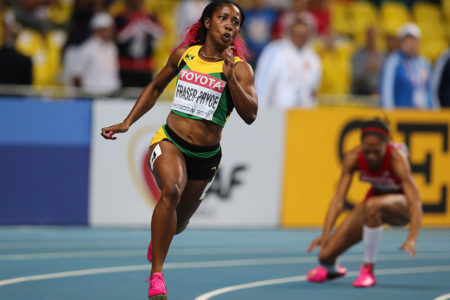Here’s this month’s collection of generally off-track activities that have gone a long way towards shaping the way the sport is headed

A Setback For van Niekerk
Back in October of ’17 400 WR holder Wayde van Niekerk injured a knee in a celebrity rugby match, causing him to miss the entire ’18 season. He had hoped to be back in the bigtime this summer, but in early July tweeted that he’d be unable to compete, explaining, “Sadly guys, I’ve had a minor setback on my road to recovery. I’ve been pushing myself a bit too hard in training so that I can make a memorable comeback but I have picked up a bone bruise on my knee so won’t be participating in the upcoming Diamond League events.” The 26-year-old (now 27) South African continued, “Now I’m working towards the goal patiently and I will review my competition schedule with my team, and together with my coach, we will decide where and when to race.” He does remain hopeful of being able to run in the World Championships in October. As the reigning champion he has Wild Card status and doesn’t need to meet any qualifying standard.
No Championship Doubling For Lyles This Year
In the wake of his narrow loss to Justin Gatlin in the Monaco 100, world-leading 200 runner Noah Lyles has announced he’ll be tackling just the half-lap race at USATF. So no double shot for the World Championships. “I feel like I’m improving in the 100m every race,” he told Gene Cherry of Reuters. “But after thinking about it the last couple days, we decided it is better to just stick to the plan we’ve had since the fall and focus on the 200m this year. Well, and the 4 x 100m!” But the 1/2 combo is on the table for next year: “We have already decided to do the double next year at the Olympic Trials. That’s for sure.” Coach Lance Brauman confirmed that was the plan, saying, “And he’ll be ready. He’s improved in the 100m even faster than either of us expected. All of Noah’s preparation, training and racing this year has been based on him running the 200m in the championship events. It doesn’t seem wise to go against all of that preparation this late in the game. He’s ready to make his first senior team and show what he can do in the 200m.”
A Jamaican Hurdle Schmozzle
While the women’s 100 hurdles at the Jamaican Championships didn’t lack for entertainment value, none of it was what fans or officials were looking for. A false start was called on defending champion Danielle Williams, who refused to leave the track, arguing that she had heard what she thought was the gun. Once she was finally ushered off after a lengthy protest, Take 2 was marred by more popping noises from the stands. The starter attempted to call the hurdlers back, but between the loud crowd and the recall gun, most ran as far as 6 flights—though one stayed in the blocks. Janeek Brown covered the entire distance before she realized she was all alone. Officials first announced they would rerun the race 45 minutes later, but later decided to scratch it completely when 3 of the participants reported that they were injured and would not go again.
The biggest complication is that the race was supposed to select the Jamaican team for Doha. The federation announced that it would send the top three Jamaicans in the IAAF’s rankings as of August 16. Williams, though, would not be eligible, as her disqualification from the first false start stood.
Brooks Signs NCAA Champs Ostrander & Nelson
Two collegiate distance standouts have joined the Brooks Beasts. Boise State’s Allie Ostrander, a 3-time national champ in the steeplechase, is foregoing her final year of collegiate eligibility to run as a pro. “Leaving Boise State was a difficult decision as I have loved my time there,” she said. “I have nothing but gratitude for @boisestatexctf for the opportunities, coaching, friendships, miles, and experiences that it has provided me with. Sad to leave, but I’m excited for this next chapter and believe it is the best route for my personal and athletic growth.”
Ostrander will be joined by Samford’s Karisa Nelson, 2017’s NCAA Indoor mile winner. “I’m excited to join the Beasts because the team is more than just a group of people working to become the best athletes they can be, they’re a team that supports each other and thrives on each other’s successes,” said Nelson. “My new teammates are some of the kindest and most honest people I have ever met. To me, in the professional world of sports, that’s something really special and it was a big reason why I decided to sign with the team.”
Goodwin Wins Million-Dollar Race
That’s right, a million bucks, but for that kind of change you might suspect it wasn’t a track competition and you’d be basically right. We’re talking about “40 Yards Of Gold,” a late-June made-for-TV affair that had various NFL speedsters dashing over football’s iconic distance. San Francisco 49er wide receiver Marquise Goodwin, the national HS recordholder in the long jump, outraced Donte Jackson by 0.05 to capture the big prize. No actual times were given, just the differentials. Goodwin posted on Instagram, “Fastest way to make a Milly.” Sprinter Christian Coleman was moved to tweet, “Lock me in for next year @40YardsofGold!! 1Million for 1 race my goodness lol.”
IAAF Loves Coe, IOC Perhaps Not So Much
At the ’15 Worlds in Beijing, Seb Coe won a hotly contested competition with fellow former WR holder Sergey Bubka to ascend to the presidency of the IAAF. “I am deeply honored that our sport has placed its trust in me. There is no job I want to do more—nor with greater commitment,” said the British middle-distance great after his 115–92 win. With his 4-year term now up, the 62-year-old Coe has tossed his hat back in the ring for another go-round as the head of the sport’s international federation. There will be no other hats this time around as he was the only one who filed an application by the deadline. The very next day, the IOC announced the names of 10 new members. Conspicuously absent from the list was Coe’s. Given track’s historic importance in the Games, his ongoing snubbing seems rather odd. Obviously, the suits in Lausanne are still punishing our sport for the transgressions of Coe’s predecessor, Lamine Diack.
No New Developments In Semenya Case
When last we left you, a Swiss Federal Tribunal had issued a stay of CAS’s decision supporting the IAAF’s position on Caster Semenya’s eligibility to compete without medical treatment. The IAAF’s official response included a request to allow its protocol to continue, saying, in part, “The IAAF fully respects each individual’s personal dignity and supports the social movement to have people accepted in society based on their chosen legal sex and/or gender identity. However, it is also committed to female athletes having the same opportunities as male athletes to benefit from athletics, be that as elite female athletes participating in fair and meaningful competition, as young girls developing life and sport skills, or as administrators or officials.
“This requires a protected category for females where eligibility is based on biology and not on gender identity. This crucial point was accepted and emphasized by the CAS in its 30 April 2019 decision to uphold the DSD Regulations. To define the category based on something other than biology would be category defeating and would deter many girls around the world from choosing competitive and elite sport after puberty. The IAAF will continue to defend its DSD Regulations and the CAS Award in the appeal proceedings before the SFT, because it continues to believe in equal rights and opportunities for all women and girls in our sport today and in the future.”
Kipchoge Gearing Up For Another Sub-2:00 Shot
No matter how you look at it, Eliud Kipchoge is the fastest marathoner in history. He’s the official WR holder at 2:01:39 (set in Berlin in September of ’18), but can also claim the all-conditions fastest 26-miler ever, having cranked out a perfectly-paced 2:00:24 (Monza, Italy in May of ’17). Now he’s ready to go for another shot at the 2-hour barrier. The latest attempt to break the mythical barrier, dubbed the “INEOS 1:59 Challenge” is a project backed by Jim Ratcliffe, the billionaire owner of the chemical firm INEOS. Ratcliffe told Reuters, “Eliud Kipchoge is the greatest ever marathon runner and the only athlete in the world who has any chance of beating the 2-hour time. Nobody’s been able to achieve this. It’s not unlike trying to put a man on the moon.”
The race is set for October 12 in the Austrian capital, Vienna. The race will be a multi-lap affair that centers on a 4.3km (2.7M) straight stretch. Vienna was chosen because of favorable weather conditions, the ability to have supporters watching the race unfold and because the city is within a 3-hour time difference of Kipchoge’s home base in Kenya. “I’ve been informed Vienna has a fast and flat course, nicely protected by trees,” Kipchoge said. “The course is as well situated in the heart of this beautiful city which will enable a great number of spectators to be part of this historical event.” Should the weather turn unfavorably, organizers have an 8-day window in which to postpone the date.
Changes Coming For Olympic-Hosting Process
The IOC has approved a series of proposals set to dramatically change the bidding process for the Olympic Games, including ending the 7-year period before the event is awarded and creating powerful commissions to control the selection of the host city/region. The new protocol will also require potential bidders to stage a public plebiscite beforehand. The IOC has been plagued with withdrawals of late. Last fall, Calgary’s voters turned down candidacy, making it the 9th straight Olympic-bid city to lose out when the general populace voted no.
Two “Future Host Commissions” (one for Summer, another for Winter) will be established to replace the current Evaluation Commission and will be given considerable power by the IOC as it will recommend cities or a single candidate to the Executive Board. Said IOC Working Group chair John Coates, “The Commission will say, ‘If you want to come to us and you’re from a country or region that is going to require a referendum, then you get that out of the way first before you make your proposal.’ It is not unreasonable to say that before we consider you, you have to satisfy us that you have the public and Government support and, consistent with that, if you are from a country that requires a referendum, come to us after you’ve had it. We don’t like to see candidates being considered and then withdrawing.” □






